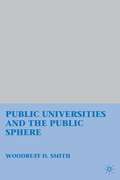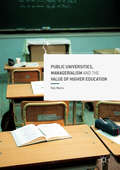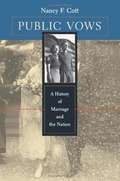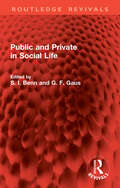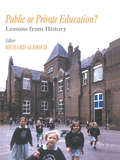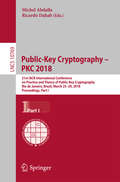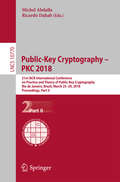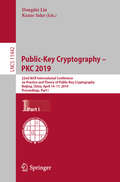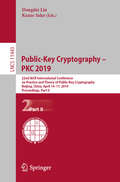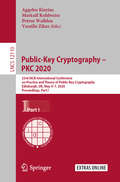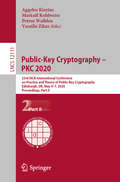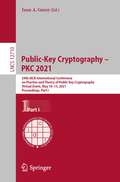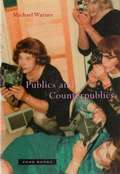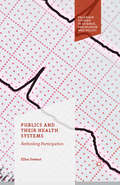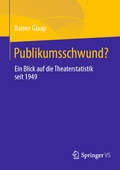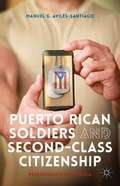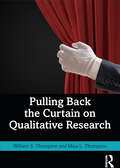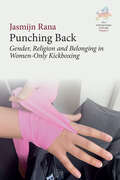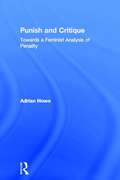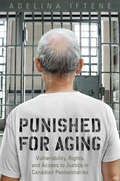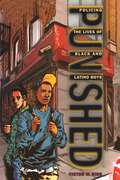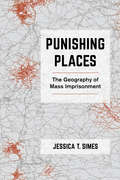- Table View
- List View
Public Universities and the Public Sphere
by Woodruff D. SmithPublic Universities and the Public Sphere argues that two crises facing America - a crisis of public discourse and a crisis of public higher education - are closely connected. Part of the solution, Smith argues in this timely work, to both crises lies in understanding and building on the connection.
Public Universities, Managerialism and the Value of Higher Education (Palgrave Critical University Studies)
by Rob WattsThis book provides a rigorous examination into the realities of the current university system in Britain, America and Australia. The radical makeover of the higher education system which began in the 1980s has conventionally been understood as universities being transformed into businesses which sell education and research in a competitive market. This engaging and provocative book argues that this is not actually the case. Drawing on lived experience, Watts asserts that the reality is actually a consequence of contradictory government policy and new public management whose exponents talk and act ‘as-if’ universities have become businesses. The result of which is ‘market crazed governance’, whereby universities are subjected to expensive rebranding and advertising campaigns and the spread of a toxic culture of customer satisfaction surveys which ask students to evaluate their teachers and what they have learned, based on government ‘metrics’ of research ‘quality’.This has led to a situation where not only the normal teacher-student relationship is inverted, academic professional autonomy is eroded and many students are short-changed, but where universities are becoming places whose leaders are no longer prepared to tell the truth and too few academics are prepared to insist they do. An impassioned and methodical study, this book will be of great interest to academics and scholars in the field of higher education and education policy.
Public Vows: A History of Marriage and the Nation
by Nancy F. CottWe commonly think of marriage as a private matter between two people, a personal expression of love and commitment. In this pioneering history, Nancy F. Cott demonstrates that marriage is and always has been a public institution.
Public and Private in Social Life (Routledge Revivals)
by S. I. Benn G. F. GausConceptions of publicness and privateness structure not only our thinking about society and ourselves, but also, by structuring our institutions and practices, dictate how we act within society. Originally published in 1983, the complexity inherent in the distinction between public and private is explored fully in this book.Opening chapters examine the familiar western liberal understanding of the public and the private; how it reflects not always coherent ideas about the relation of individuals to society, and how it structures legal, political, economic and moral practices and institutions.Attention is turned to Hegelian, Marxist and feminist critiques on the public and private dichotomy, and the study concludes with a comparative analysis of the public and the private in three non-western forms of society. In all, this study provides a fascinating insight into the ways different societies see themselves and into the concepts that shape society today.
Public or Private Education?: Lessons from History (Woburn Education Series)
by Richard AldrichThis collection of essays, edited by the distinguished historian of education Richard Aldrich, examines past, present and future relationships between the private and public dimensions of knowledge and education. Following the introduction, it is divided into three sections: * key themes and turning points in Britain in the eighteenth, nineteenth and twentieth centuries* examples from the twentieth century of non formal education with particular reference to girls and women, the care and education of pre-school children, sex education and family history* an analysis of the private and public dimensions associated with globalization and international education and of examples drawn from Australia and the USA. This book will become required reading not only in respect of contemporary and historical debates about private and public spheres in education, but also with reference to the wider themes of the creation, diffusion and ownership of knowledge.
Public-Key Cryptography – PKC 2018: 21st Iacr International Conference On Practice And Theory Of Public-key Cryptography, Rio De Janeiro, Brazil, March 25-29, 2018, Proceedings (Lecture Notes in Computer Science #10770)
by Michel Abdalla Ricardo DahabThe two-volume set LNCS 10769 and 10770 constitutes the refereed proceedings of the 21st IACR International Conference on the Practice and Theory of Public-Key Cryptography, PKC 2018, held in Rio de Janeiro, Brazil, in March 2018. The 49 revised papers presented were carefully reviewed and selected from 186 submissions. They are organized in topical sections such as Key-Dependent-Message and Selective-Opening Security; Searchable and Fully Homomorphic Encryption; Public-Key Encryption; Encryption with Bad Randomness; Subversion Resistance; Cryptanalysis; Composable Security; Oblivious Transfer; Multiparty Computation; Signatures; Structure-Preserving Signatures; Functional Encryption; Foundations; Obfuscation-Based Cryptographic Constructions; Protocols; Blockchain; Zero-Knowledge; Lattices.
Public-Key Cryptography – PKC 2018: 21st Iacr International Conference On Practice And Theory Of Public-key Cryptography, Rio De Janeiro, Brazil, March 25-29, 2018, Proceedings (Lecture Notes in Computer Science #10770)
by Michel Abdalla Ricardo DahabThe two-volume set LNCS 10769 and 10770 constitutes the refereed proceedings of the 21st IACR International Conference on the Practice and Theory of Public-Key Cryptography, PKC 2018, held in Rio de Janeiro, Brazil, in March 2018. The 49 revised papers presented were carefully reviewed and selected from 186 submissions. They are organized in topical sections such as Key-Dependent-Message and Selective-Opening Security; Searchable and Fully Homomorphic Encryption; Public-Key Encryption; Encryption with Bad Randomness; Subversion Resistance; Cryptanalysis; Composable Security; Oblivious Transfer; Multiparty Computation; Signatures; Structure-Preserving Signatures; Functional Encryption; Foundations; Obfuscation-Based Cryptographic Constructions; Protocols; Blockchain; Zero-Knowledge; Lattices.
Public-Key Cryptography – PKC 2019: 22nd IACR International Conference on Practice and Theory of Public-Key Cryptography, Beijing, China, April 14-17, 2019, Proceedings, Part I (Lecture Notes in Computer Science #11442)
by Dongdai Lin Kazue SakoThe two-volume set LNCS 11442 and 11443 constitutes the refereed proceedings of the 22nd IACR International Conference on the Practice and Theory of Public-Key Cryptography, PKC 2019, held in Beijing, China, in April 2019. The 42 revised papers presented were carefully reviewed and selected from 173 submissions. They are organized in topical sections such as: Cryptographic Protocols; Digital Signatures; Zero-Knowledge; Identity-Based Encryption; Fundamental Primitives; Public Key Encryptions; Functional Encryption; Obfuscation Based Cryptography; Re- Encryption Schemes; Post Quantum Cryptography.
Public-Key Cryptography – PKC 2019: 22nd IACR International Conference on Practice and Theory of Public-Key Cryptography, Beijing, China, April 14-17, 2019, Proceedings, Part I (Lecture Notes in Computer Science #11442)
by Dongdai Lin Kazue SakoThe two-volume set LNCS 11442 and 11443 constitutes the refereed proceedings of the 22nd IACR International Conference on the Practice and Theory of Public-Key Cryptography, PKC 2019, held in Beijing, China, in April 2019. The 42 revised papers presented were carefully reviewed and selected from 173 submissions. They are organized in topical sections such as: Cryptographic Protocols; Digital Signatures; Zero-Knowledge; Identity-Based Encryption; Fundamental Primitives; Public Key Encryptions; Functional Encryption; Obfuscation Based Cryptography; Re- Encryption Schemes; Post Quantum Cryptography.
Public-Key Cryptography – PKC 2019: 22nd IACR International Conference on Practice and Theory of Public-Key Cryptography, Beijing, China, April 14-17, 2019, Proceedings, Part II (Lecture Notes in Computer Science #11443)
by Dongdai Lin Kazue SakoThe two-volume set LNCS 11442 and 11443 constitutes the refereed proceedings of the 22nd IACR International Conference on the Practice and Theory of Public-Key Cryptography, PKC 2019, held in Beijing, China, in April 2019. The 42 revised papers presented were carefully reviewed and selected from 173 submissions. They are organized in topical sections such as: Cryptographic Protocols; Digital Signatures; Zero-Knowledge; Identity-Based Encryption; Fundamental Primitives; Public Key Encryptions; Functional Encryption; Obfuscation Based Cryptography; Re- Encryption Schemes; Post Quantum Cryptography.
Public-Key Cryptography – PKC 2020: 23rd IACR International Conference on Practice and Theory of Public-Key Cryptography, Edinburgh, UK, May 4–7, 2020, Proceedings, Part I (Lecture Notes in Computer Science #12110)
by Vassilis Zikas Aggelos Kiayias Markulf Kohlweiss Petros WalldenThe two-volume set LNCS 12110 and 12111 constitutes the refereed proceedings of the 23rd IACR International Conference on the Practice and Theory of Public-Key Cryptography, PKC 2020, held in Edinburgh, UK, in May 2020. The 44 full papers presented were carefully reviewed and selected from 180 submissions. They are organized in topical sections such as: functional encryption; identity-based encryption; obfuscation and applications; encryption schemes; secure channels; basic primitives with special properties; proofs and arguments; lattice-based cryptography; isogeny-based cryptography; multiparty protocols; secure computation and related primitives; post-quantum primitives; and privacy-preserving schemes.
Public-Key Cryptography – PKC 2020: 23rd IACR International Conference on Practice and Theory of Public-Key Cryptography, Edinburgh, UK, May 4–7, 2020, Proceedings, Part II (Lecture Notes in Computer Science #12111)
by Vassilis Zikas Aggelos Kiayias Markulf Kohlweiss Petros WalldenThe two-volume set LNCS 12110 and 12111 constitutes the refereed proceedings of the 23rd IACR International Conference on the Practice and Theory of Public-Key Cryptography, PKC 2020, held in Edinburgh, UK, in May 2020. The 44 full papers presented were carefully reviewed and selected from 180 submissions. They are organized in topical sections such as: functional encryption; identity-based encryption; obfuscation and applications; encryption schemes; secure channels; basic primitives with special properties; proofs and arguments; lattice-based cryptography; isogeny-based cryptography; multiparty protocols; secure computation and related primitives; post-quantum primitives; and privacy-preserving schemes.
Public-Key Cryptography – PKC 2021: 24th IACR International Conference on Practice and Theory of Public Key Cryptography, Virtual Event, May 10–13, 2021, Proceedings, Part I (Lecture Notes in Computer Science #12710)
by Juan A. GarayThe two-volume proceedings set LNCS 12710 and 12711 constitutes the proceedings of the 24th IACR International Conference on Practice and Theory of Public Key Cryptography, PKC 2021, which was held online during May 10-13, 2021. The conference was originally planned to take place in Edinburgh, UK, but had to change to an online format due to the COVID-19 pandemic.The 52 papers included in these proceedings were carefully reviewed and selected from 156 submissions. They focus on all aspects of public-key cryptography, covering theory, implementations and applications. This year, post-quantum cryptography, PQC constructions and cryptanalysis received special attention.
Publics and Counterpublics
by Michael WarnerMichael Warner addresses the question: What is a public? According to Warner, the idea of a public is one of the central fictions of modern life. Publics have powerful implications for how our social world takes shape, and much of modern life involves struggles over the nature of publics and their interrelations. The idea of a public contains ambiguities, even contradictions. As it is extended to new contexts, politics, and media, its meaning changes in ways that can be difficult to uncover. Combining historical analysis, theoretical reflection, and extensive case studies, Warner shows how the idea of a public can reframe our understanding of contemporary literary works and politics and of our social world in general.
Publics and Their Health Systems: Rethinking Participation (Palgrave Studies in Science, Knowledge and Policy)
by Ellen StewartDrawing on a detailed case study of Scotland's National Health Service, this book argues that debates about citizen participation in health systems are disproportionately dominated by techniques of invited participation. A 'system's-eye' perspective, while often well-intentioned, has blinded us to other standpoints for understanding the complex relationship between publics and their health systems. Publics and Their Health Systems takes a 'citizen's-eye' perspective, exploring not only conventional invited participation, but also the realms of representative democracy, contentious protest politics, and the micro-level tactics used by individual citizens in their encounters with health services. The book highlights more oppositional dynamics than those which characterise much invited participation, and argues that understanding these is a crucial step towards a more inclusive and democratic health system.
Publikumsschwund?: Ein Blick auf die Theaterstatistik seit 1949
by Rainer GlaapDurch den teils massiven Publikumsschwund nach der Pandemie stellt sich die Frage, ob diese als Brandbeschleuniger gewirkt hat für bereits vorhandene Trends. Der Autor geht dem nach anhand der Besuchszahlen bis zur letzten vollständigen vorpandemischen Spielzeit 2018/19. Er zeigt historische Zeitreihen zu Sparten- und Personalentwicklung, Vertriebskanälen und den Einnahmen. Die Theaterstatistik des Bühnenvereins dient vielen Entscheidungsträgern als Grundlage für z.B. kulturpolitische Steuerungen, obwohl sie nicht die komplette deutsche Theaterlandschaft abbildet. Deshalb beleuchtet der Autor weitere Anbieter. Da die Theaterstatistik große kulturpolitische Bedeutung hat, gibt es zum Schluss einige Vorschläge für die Zukunft.
Publishing in the Digital Age: How Business Can Thrive in a Rapidly Changing Environment
by Michael N. RossThe world of publishing is evolving at an ever-increasing speed, with developments in digital workstreams and products, customer expectation, enriched content curation, and user-generated content becoming commonplace. In Publishing in the Digital Age: How Business Can Thrive in a Rapidly Changing Environment, Ross discusses the most significant and recent developments in educational and trade publishing, educational technology, and marketing that has enabled a new generation of content creators to reach more consumers. It is the only book that addresses disruption in the industry head on. Building on the insights from his last book, Dealing with Disruption: Lessons from the Publishing Industry, Ross takes a fresh look at the publishing environment and provides the reader with a clear view of how publishing has evolved and how it has benefitted consumers regardless of their preferred medium for accessing knowledge. Through an examination of what has worked and what has not, and with Ross’s unique perspective of more than 35 years of publishing success, Publishing in the Digital Age presents an indispensable overview of the publishing industry, how it has evolved during the first quarter of the 21st century, and how publishers, content providers, and consumers can benefit from the many options that are available today. With insights from industry leaders, Ross discusses new opportunities on the Web, streaming services, and audio formats. He reviews new publishing platforms and provides a practical guide for content developers to address the knowledge needs of their constituents by giving readers real-life, actionable examples of how best to publish their content consistent with users’ purchasing preferences. The book will be of interest to specialists in education: K-12 and higher education, the non-fiction trade, corporate education trainers, and specialist sectors such as scholarly, technical, and medical publishing. It includes clear applications for any business that is undergoing transformation or is forced to make a radical pivot because of sudden environmental changes or market conditions.
Puerto Rican Soldiers and Second-Class Citizenship: Representations in Media
by Manuel G. Avilés-SantiagoPuerto Rican soldiers have been consistently whitewashed out of the narrative of American history despite playing parts in all American wars since WWI. This book examines the online self-representation of Puerto Rican soldiers who served during the War on Terror, focusing on social networking sites, user-generated content, and web memorials.
Pulling Back the Curtain on Qualitative Research
by William E. Thompson Mica L. ThompsonIn Pulling Back the Curtain on Qualitative Research, the authors maintain that for sociologists the entire world is a laboratory. Seldom do they attend social gatherings without observing people and their interaction in a systematic and intellectually curious way. Regular trips to the grocery store, church services, and engagement with social media all open the door to sociological questioning and encourage forms of empirical observation and data collection. Here, in this practical and in-depth guide to conducting qualitative sociological field research, the authors offer step-by-step guidance to the processes of choosing a research question and forming research objectives; gaining entry to research settings; and reporting and analyzing findings. Each chapter features a past research assignment, wherein the authors draw attention to important ethical considerations and extract the many lessons, quirks, and unanticipated findings they experienced along the way that readers should prepare for and apply while conducting their own qualitative fieldwork. Over the span of several field studies, this book offers readers a behind-the-scenes look at some tested and trusted qualitative methodologies. Designed to be a guide for undergraduate and graduate level students, its real-life meditations would make a meaningful addition to anyone serious about conducting sociological research.
Punching Back: Gender, Religion and Belonging in Women-Only Kickboxing (New Anthropologies of Europe: Perspectives and Provocations #5)
by Jasmijn RanaIn the Netherlands, girls and young women are increasingly active in women-only kickboxing. The general assumption, in the Netherlands and in western Europe more broadly, is that women’s sport is a form of secular, feminist empowerment. Muslim women’s participation would then exemplify the incongruence of Islam with the modern, secular nation-state. Punching Back provides a detailed ethnographic study that contests this view by showing that young Muslim women who kickbox establish agentive selves by playing with gender norms, challenging expectations, and living out their religious subjectivities.
Punish and Critique: Towards a Feminist Analysis of Penality (Sociology of Law and Crime)
by Adrian HoweAcknowledgements Introduction 1. Political economies of punishment 2. 'New histories of punishment regimes 3. The Foucault Effect: from penology to penality 4. Feminist analytical approaches to women's imprisonment 5. Postmodern feminism and the question of penalty 6. Towards a postmodern penal politic? Bibliography
Punished for Aging: Vulnerability, Rights, and Access to Justice in Canadian Penitentiaries
by Adeline IfteneBuilt around the experiences of older prisoners, Punished for Aging looks at the challenges individuals face in Canadian penitentiaries and their struggles for justice. Through firsthand accounts and quantitative data drawn from extensive interviews, this book brings forward the experiences of federally incarcerated people living their "golden years" behind bars. These experiences show the limited ability of the system to respond to heightened needs, while also raising questions about how international and national laws and policies are applied, and why they fail to ensure the safety and well-being of incarcerated individuals. In so doing, Adelina Iftene explores the shortcomings of institutional processes, prison-monitoring mechanisms, and legal remedies available in courts and tribunals, which leave prisoners vulnerable to rights abuses. Some of the problems addressed in this book are not new; however, the demographic shift and the increase in people dying in prisons after long, inadequately addressed illnesses, with few release options, adds a renewed sense of urgency to reform. Working from the interview data, contextualized by participants’ lived experiences, and building on previous work, Iftene seeks solutions for such reform, hich would constitute a significant step forward not only in protecting older prisoners, but in consolidating the status of incarcerated individuals as holders of substantive rights.
Punished: Policing the Lives of Black and Latino Boys (New Perspectives in Crime, Deviance, and Law #7)
by Victor M. RiosHonorable Mention, 2014 Eduardo Bonilla-Silva Outstanding Book Award presented by the Society for the Study of Social Problems2012 Best Book Award, Latino/a Sociology Section, presented by the American Sociological Association2012 Finalist, C. Wright Mills Book Award presented by the Study of Social ProblemsA classic ethnography that reveals how urban police criminalize black and Latino boysVictor Rios grew up in the ghetto of Oakland, California in the 1980s and 90s. A former gang member and juvenile delinquent, Rios managed to escape the bleak outcome of many of his friends and earned a PhD at Berkeley and returned to his hometown to study how inner city young Latino and African American boys develop their sense of self in the midst of crime and intense policing. Punished examines the difficult lives of these young men, who now face punitive policies in their schools, communities, and a world where they are constantly policed and stigmatized.Rios followed a group of forty delinquent Black and Latino boys for three years. These boys found themselves in a vicious cycle, caught in a spiral of punishment and incarceration as they were harassed, profiled, watched, and disciplined at young ages, even before they had committed any crimes, eventually leading many of them to fulfill the destiny expected of them. But beyond a fatalistic account of these marginalized young men, Rios finds that the very system that criminalizes them and limits their opportunities, sparks resistance and a raised consciousness that motivates some to transform their lives and become productive citizens. Ultimately, he argues that by understanding the lives of the young men who are criminalized and pipelined through the criminal justice system, we can begin to develop empathic solutions which support these young men in their development and to eliminate the culture of punishment that has become an overbearing part of their everyday lives.
Punished: Policing the Lives of Black and Latino Boys (New Perspectives in Crime, Deviance, and Law Series)
by Victor M. RiosThis book examines the difficult lives of young Latino and African American boys caught in a cycles of delinquency in a legal system that limits their opportunities.
Punishing Places: The Geography of Mass Imprisonment
by Jessica T. SimesPunishing Places applies a unique spatial analysis to mass incarceration in the United States. It demonstrates that our highest imprisonment rates are now in small cities, suburbs, and rural areas. Jessica Simes argues that mass incarceration should be conceptualized as one of the legacies of U.S. racial residential segregation, but that a focus on large cities has diverted vital scholarly and policy attention away from communities affected most by mass incarceration today. This book presents novel measures for estimating the community-level effects of incarceration using spatial, quantitative, and qualitative methods. This analysis has broad and urgent implications for policy reforms aimed at ameliorating the community effects of mass incarceration and promoting alternatives to the carceral system.
